El presente simple, también llamado del indicativo, es el tiempo verbal más simple del inglés. Se suele utilizar para hablar sobre hechos que constituyen hábitos o costumbres.
Se forma con la forma base del verbo del infinitivo. Este infinitivo consta de dos partículas: to y la forma base del verbo, así, por ejemplo, to eat es un infinitivo que significacomer.
Conozcamos en la siguiente tabla el presente del indicativo:
Conjugación | Inglés | Español |
1ª per. singular | I work | yo trabajo |
2ª per. singular | you work | tú trabajas |
3ª per. singular | he works she works It works | él trabaja ella trabaja (para objetos) |
1ª per. plural | we work | nosotros/as trabajmos |
2ª per. plural | you work | vosotros/as trabajais |
3ª per. plural | they work | ellos/as trabajan |
La única dificultad escriba, como de costumbre, en la 3ª persona del singular; de hecho, esta 3ª persona es especial a la hora de conjugar verbos. Como regla general se añade s, aunque veremos que existen algunas excepciones.
Usos del presente simple
Este tiempo verbal se utiliza para expresar hechos o verdades generales.
The Sun warms the atmosphere. -> El Sol calienta la armósfera.
También usamos el presente simple para hablar de hábitos; en este caso, en la oración suele aparecer expresiones de frecuencia, como usually o always.
We play tennis usually. -> Nosotros jugamos al tenis ocasionalmente.
You study always. -> Vosotros estudiais siempre.
Tambien lo usamos para expresar horarior o programas (como el programa de un espectáculo teatral).
The train leaves in an hour. -> El tren llega en una hora.
Reglas ortográficas para la 3ª persona del singular
Como regla general, a la forma verbal de la 3ª persona del singular se le añade s; no obstante,existen unas cuantas reglas para una serie de formas verbales que son especiales:
1.- Cuando el verbo acaba ya en s, o en un sonido parecido como sh, ch o x:
watch -> watches (mirar) dash -> dashes (arrojar)
2.- Cuando el verbo acaba en o, también se añade es:
go -> goes (ir) do -> does (hacer)
3.- Cuando el verbo acaba en y, y a ésta le precede una consonante, tenemos que cambiar lay por i, para a continuación añadir es:
fly -> flies (volar) study -> studies (estudiar)
Observa que estas reglas ortográficas son las mismas que se aplican para formar el plural. También son las que se usan para formar otros tiempos verbales, por lo que una vez que las aprendas tendrás mucho ganado.
Las oraciones negativas se forman con el auxiliar "to do", habitualmente en sus formas contraídas: "don´t" (= do not) para las personas "I, you, we, they", y "doesn´t" (= does not) para las personas "he, she, it".
| I don't play tennis. | Yo no juego al tenis |
| She doesn´t go to the cinema. | Ella no va al cine |
| We don´t know the answer. | Nosotros no sabemos la respuesta |
La forma interrogativa se forma también con el auxiliar "to do" al comienzo de la oración ("do" con las personas "I, you, we, they"; "does" con "he, she, it").
| Do you play tennis? | ¿ Juegas al tenis ? |
| Does she go to the cinema? | ¿ Va ella al cine ? |
| Do we know the answer? | ¿ Conocemos la respuesta ? |
The Routine
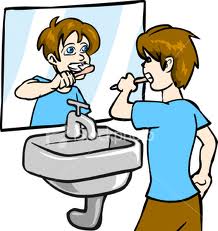
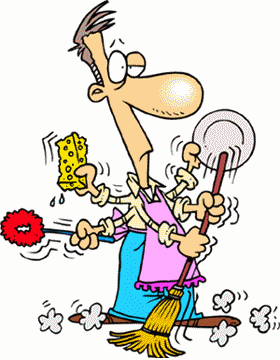
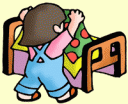
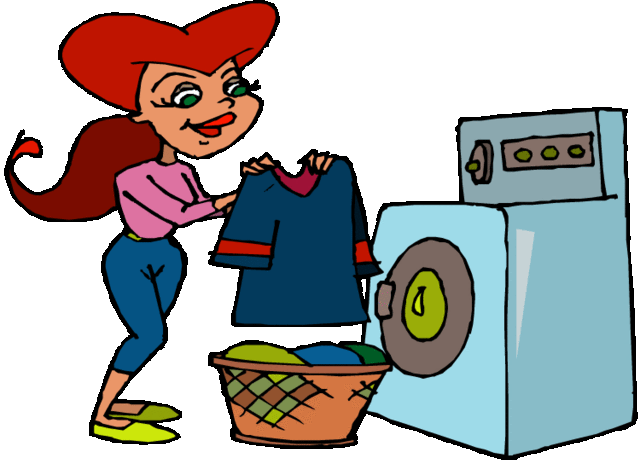
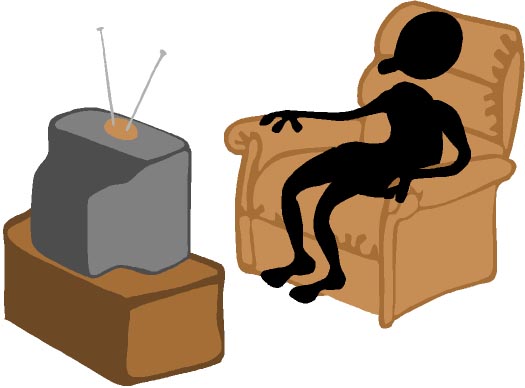
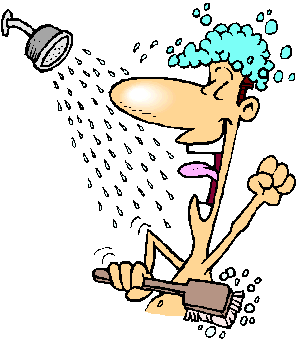
EVERYDAY ACTIVITIES
I. Part. Look at the following pictures below and write the name that corresponds to each name.






| make the bed / take a shower / brush my teeth / make the bed / clean the house / do the laundry |
II. Part Complete the following statements by writing the simple present tense. Add "s", "es", "ies" depending on each case.
1. Mr. Guzmán to school every morning. 

2. She in the afternoon. 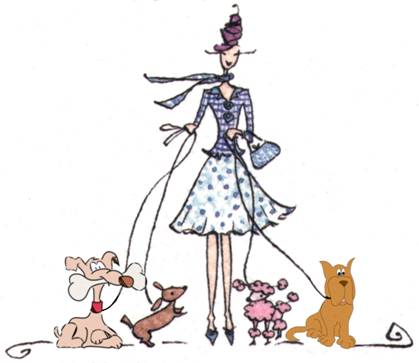

3. Cris and her mother the dishes. 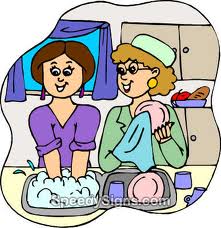

4. Mr and Mrs. Smith the their dog. 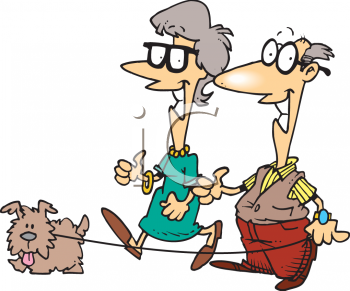

5. My aunt at the office every week. 

III. Part. Choose the alternative that best answers each sentence correctly.
1. She my homework.2. Luis basketball.3. He and she in the same place.4. María a bath at night.5. Warner pizza.6. They a letter.7. Fernando to work.8. Oldemar a motorcycle.9. Ross French.10. Magda my car.
IV. Part. Rewrite the following statements in the correct order.
a) swim / doesn't / Martha.b) use / Abigail / the computer.c) José / every day / ride his bike.d) buy / usually / Cris and Mike / new tv showse) never /My mother / walk the dogs.f) eat pizza / Carlos / sometimes /g) the guitar/ Deiber / play /almost always /h) rarely /David / study.i) Constantly/ Kimbly / wash my car /j) have / Gerard/ two black cars.
V. Look at the following word search the Daily Routines.
My Daily Routine
It seems my life is always very full of activities and obligations so I never have much time for myself. During the week it's the worst. I usually have to get up at half past five even though I would really prefer to sleep much later. After I get up I perform my morning routine of having a shower, brushing my teeth, and then deciding what to wear. After I get dressed I brush my hair. I usually don’t have time for breakfast in the morning because I have to catch a bus at half past seven for my commute at university. I always arrive at quarter to eight in the morning, and start my classes at 8 o'clock after I take a break from half past nine until ten o'clock.
After classes I sometimes go shopping or just walk around the city for a while. When I get home I like to relax for some time, take a nap, listen to music, watch television, and maybe get a little snack. Then I start my homework or help with some housework. Before I know it, the afternoon is gone and it is evening.
In my family, we usually eat dinner at about seven o'clock. At dinner we discuss what happened during the day and catch up with each others' lives. After I help clean up the dinner dishes I either take a shower or have a bath myself. Then I have some time to watch the TV news. Sometimes, I watch an interesting film or music program on TV or a video. Sometimes, I like to go downtown to see a movie or to go to a concert with my friends. About every other day, I have a date with my girlfriend. she comes to watch TV at my home or we might go out for a walk. I usually manage to go to bed around eleven PM.
So this is my daily routine during the week. On the weekend ("at the weekend") it is a different story, I like to sleep late and do whatever I wish with my free time. I am still expected to help my parents out around the house but I still have most of the time for myself and my interests. I can go for a trip with my girl and friends, I can visit my relatives or I can devote more time to my hobbies. I think everyone will agree that weekends are much better than weekdays.
see you soon bye bye....
It seems my life is always very full of activities and obligations so I never have much time for myself. During the week it's the worst. I usually have to get up at half past five even though I would really prefer to sleep much later. After I get up I perform my morning routine of having a shower, brushing my teeth, and then deciding what to wear. After I get dressed I brush my hair. I usually don’t have time for breakfast in the morning because I have to catch a bus at half past seven for my commute at university. I always arrive at quarter to eight in the morning, and start my classes at 8 o'clock after I take a break from half past nine until ten o'clock.
After classes I sometimes go shopping or just walk around the city for a while. When I get home I like to relax for some time, take a nap, listen to music, watch television, and maybe get a little snack. Then I start my homework or help with some housework. Before I know it, the afternoon is gone and it is evening.
In my family, we usually eat dinner at about seven o'clock. At dinner we discuss what happened during the day and catch up with each others' lives. After I help clean up the dinner dishes I either take a shower or have a bath myself. Then I have some time to watch the TV news. Sometimes, I watch an interesting film or music program on TV or a video. Sometimes, I like to go downtown to see a movie or to go to a concert with my friends. About every other day, I have a date with my girlfriend. she comes to watch TV at my home or we might go out for a walk. I usually manage to go to bed around eleven PM.
So this is my daily routine during the week. On the weekend ("at the weekend") it is a different story, I like to sleep late and do whatever I wish with my free time. I am still expected to help my parents out around the house but I still have most of the time for myself and my interests. I can go for a trip with my girl and friends, I can visit my relatives or I can devote more time to my hobbies. I think everyone will agree that weekends are much better than weekdays.
see you soon bye bye....
HERE WE HAVE SOME EXPRESSIONS TO USE IN OUR DAILY ROUTINES

















